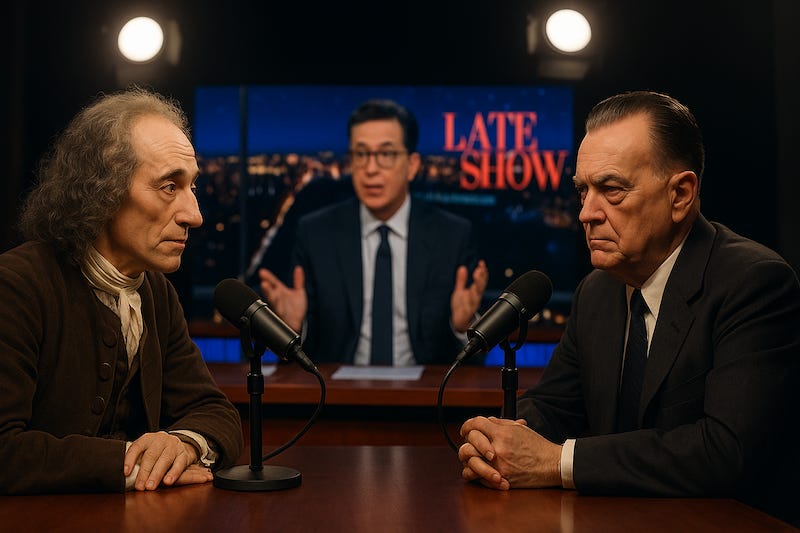Stephen Colbert on Trial: Hoover vs. Voltaire
Transcript extracted via ChronoTranscriptor™ – Opinions preserved, powdered wigs optional.
[Host Introduction]
Tonight on ChronoTalks, we examine a modern flashpoint: the controversy surrounding The Late Show with Stephen Colbert and its cancellation.
At the heart of the debate: Was it a political decision?
And more broadly: Does satire remain a protected form of speech in an age of outrage and division?
To discuss, we welcome two titans of history with opposing philosophies:
J. Edgar Hoover, founding Director of the FBI, famed for his rigorous control over public morality and national narrative.
Voltaire, Enlightenment philosopher, author, wit, and firebrand defender of civil liberties—especially freedom of speech.
Gentlemen, welcome.
[Opening Statements]
Hoover (measured, direct):
Let me begin by stating: public broadcasting is not immune to review. When a national platform like The Late Show becomes a megaphone for political agitation masquerading as comedy, questions must be asked.
If cancellation serves to preserve trust in media—or to protect the integrity of national discourse—it is not censorship. It is accountability.
Voltaire (smiling, sharp):
Monsieur Hoover, you see subversion in every jest. I see awakening.
Satire has always been the tool of the weak against the strong. That is its nobility.
To silence a jester because he mocks a king—or a president—is not protection. It is cowardice dressed as patriotism.
[On Political Motivation]
Host: Mr. Hoover, critics say that any cancellation of Colbert would be politically motivated. Do you believe that matters?
Hoover: Motivation is only half the story. Effect matters more.
A program with consistent partisan messaging influences millions. It’s a feedback loop of ideology, disguised as late-night entertainment. If officials—or networks—decide such programming no longer serves public interest, their decision may be wise, not wicked.
Voltaire: Forgive me, but your definition of “public interest” smells suspiciously like “personal interest.”
When satire bites, it means it is close to truth. That discomfort is necessary. A government that fears a joke is a government already weakened.
I ask: which is more dangerous—a comedian with a punchline, or a leader who cannot laugh?
[On Free Speech vs. Platform Responsibility]
Host: Voltaire, surely there’s a distinction between free speech and having a platform. Can a network choose to cancel without it being censorship?
Voltaire: Of course. A baker may refuse to sell bread. But if every baker in town does so because the mayor disapproves of your appetite—that’s no longer commerce. That’s suppression.
When power leans upon private institutions to shape what the people may hear—it ceases to be voluntary.
Hoover: And yet, responsibility remains. With power—yes, even comedic power—comes obligation. If Mr. Colbert’s “humor” consistently undermines faith in lawful institutions, that’s no longer harmless satire. That’s agitation.
We cannot allow liberty to become license.
[On Precedent]
Host: What message does cancellation send to future voices?
Hoover: That performance has boundaries.
Voltaire: That truth has enemies.
[Closing Statements]
Hoover: The republic endures because of rules, not mockery. Colbert may have been clever. But cleverness is not above consequence.
Voltaire: The republic only endures because of mockery. When kings were gods, it was the jester who whispered doubt. I would rather live among laughter and danger than silence and order.
[Host Closing]
Whether you believe The Late Show is a satirical treasure or an ideological weapon, this debate reminds us:
The line between comedy and control is thin—and fiercely contested.
Join us next time on ChronoTalks, where voices from the past argue about the present... like your future depends on it.
As Stephen and Evie Colbert tell it, Does This Taste Funny? was born during the Covid lockdown. “We were all stuck together and couldn’t go out, so we cooked,” they recall. “For the first time in years, all three kids were back under one roof, and we shared dinner together every night. Cooking became our entertainment.”
Now, the Colberts open the doors to their kitchen and welcome readers to their table. Blending humor, warmth, and a touch of irreverence, this book features a collection of favorite recipes from Stephen, Evie, their family, and friends. You’ll find Party Food (“called ‘party food’ because ‘appetizers’ implies there’s something after—when often, this is the whole meal”), Seafood, Poultry and Meat (“Evie and I have different relationships with meat. I like it. Evie can take it or leave it—and mostly, she leaves it”), Desserts (“one of the largest sections—Evie says desserts are a great way to delay doing the dishes”), and Drinks (“I love cocktail hour—it feels like a reward for not having had a cocktail all day”).
Threaded throughout are witty exchanges between Stephen and Evie, along with stunning photos of their food, home, and family life—a feast not just for the palate, but for the heart and funny bone alike. More information…



